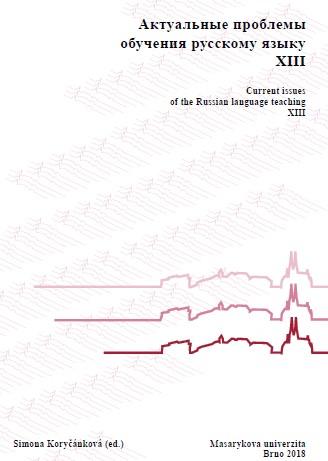ЛИНГВОКУЛЬТУРОЛОГИЧЕСКИЙ И ЛИНГВОКОГНИТИВНЫЙ АСПЕКТЫ В ОБУЧЕНИИ СТУДЕНТОВ РКИ (СОВЕТСКИЕ ИСТОРИЧЕСКИЕ РЕАЛИИ И ИХ АКТУАЛЬНОЕ НАСЛЕДИЕ)
LINGUACULTUROLOGY AND LINGUОCOGNITIVE ASPECTS OF TEACHING RUSSIAN AS A FOREIGN LANGUAGE (SOVIET HISTORICAL REALITIES AND THEIR CURRENT HERITAGE)
Author(s): Nikoleta Mertová
Subject(s): Foreign languages learning, Language acquisition, Eastern Slavic Languages
Published by: Masarykova univerzita nakladatelství
Keywords: political discourse; linguoculturology; Soviet realities; sovietism; teaching Russian as a foreign language; linguocognitive analysis; linguoculturological analysis; metaphoricity;
Summary/Abstract: The language of the Soviet era in many respects reflects the reality not only of everyday use of language for communicative purposes, but also of its ideological and ideologized side - the politicization of everyday communication in Soviet reality. The article claims to differentiate by means of linguocultural and linguocognitive methods of researching the political discourse of the original, initial values of the analyzed material from their Soviet constructs. Typical examples are the Soviet aphorisms, metaphors and phraseological units of Lingua Imperii Sovietici (the term of Khlebda), reflecting the realities of the Soviet world and differing from „their“ later modifications in the post-Soviet era by attributes of directivity, ideology, literalness or manipulativeness. For this type of political discourse, in general, the multifacetedness of both linguoculturological and linguocognitive models is typical. According to Chudinov, this specific feature of political discourse reflects the features of modern reality, the specifics of human understanding and perception of a given reality, which are not determined by contemporary experience and their associative basis is often based on historical experience. On the basis of the above, it can be concluded that a metaphor – the key link in the category and conceptualization of the world in human co-existence – does not possess empirical content that native speakers and specific national mentality can translate into metaphorical images. Metaphor is a specific concentrate of emotional, mental and cognitive activity of a person. Based on our research, in many cases the student's identification of historical metaphorical images in a historical context is exaggerated, for, for example, the constructs of Sovietism are often analogous to the original Russian expression in a formal aspect.
Book: Актуальные проблемы обучения русскому языку XIII
- Page Range: 562-569
- Page Count: 8
- Publication Year: 2018
- Language: Russian
- Content File-PDF

